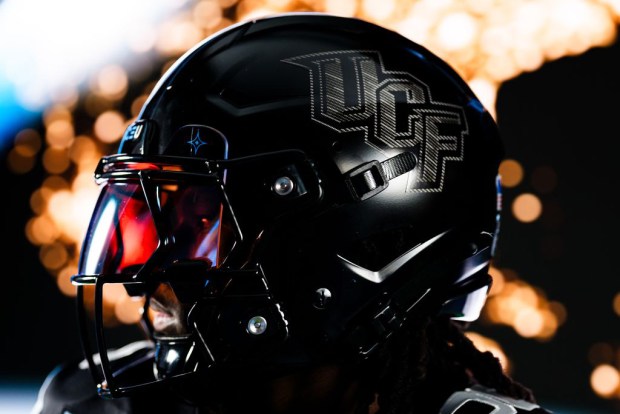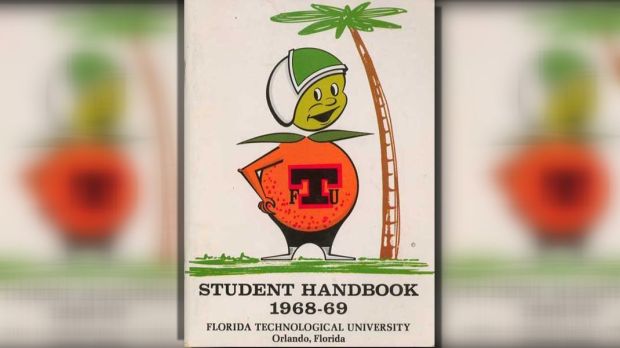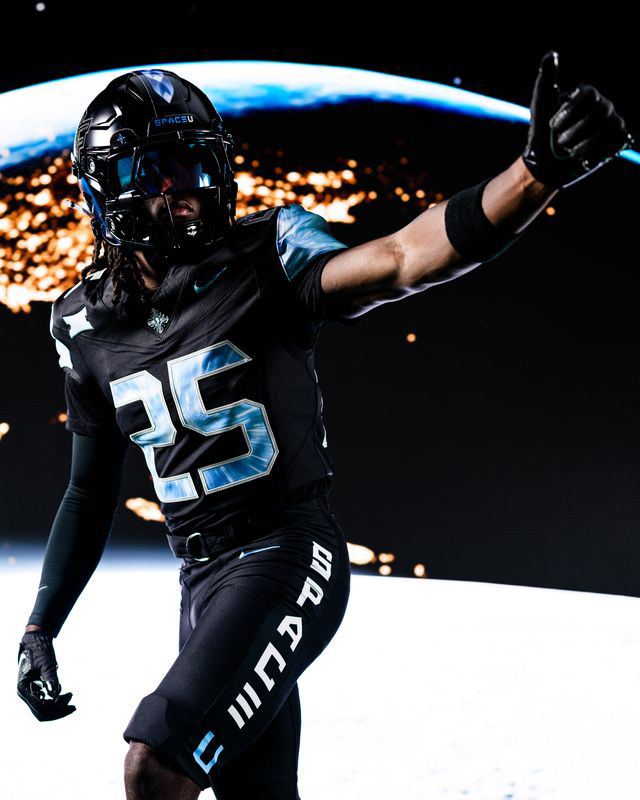On Friday night, when UCF takes the field against Houston in what’s being billed as “The Space Game,” there’s really only one question worth asking:
Which school is truly America’s “Space University”?
Spoiler alert: it’s not the one that keeps reminding everyone that NASA Mission Control happens to be in its city limits.
Because, let’s face it, Texas might be home to, “Houston, we have a problem” — but UCF is home to “Orlando, we have the solution.”
That’s right, UCF doesn’t just talk about space; it celebrates it, studies it, builds it, launches it and even dedicates an entire football game to it.
“I think it’s really cool that our football program can be a part of and support our university’s ties to NASA,” UCF coach Scott Frost says. “I think it’s sort of our secondary identity; our alter ego.”
Adds middle linebacker Cole Kozlowski: “When we put on our space uniforms, it’s takeoff time!”
The Space Game, now an annual tradition in Orlando, isn’t just a gimmick or marketing stunt. It’s a tribute — to history, to ambition and to the Florida Space Coast that helped launch humanity into the heavens.
And that’s what makes this matchup so deliciously ironic.
Houston’s nickname might be “Space City,” but when it comes to actually honoring the industry that made America blast off into a new frontier, UCF is ranked No. 1 and Houston is a distant second. To be fair, though, Houston’s ties to the space industry pre-date UCF and go back to 1961, when it built a satellite campus near Johnson Space Center to help supply the space industry with engineers and scientists.
However, UCF’s entire existence was built because of the space industry. UCF has roads on campus named after space — Gemini Boulevard, Andromeda Loop, Apollo Circle and Orion — the road that circles the football stadium. By design, the 50-yard line at the stadium lines up on the same latitude as NASA’s historical Launch Complex 39A.
UCF turns the Bounce House into a launch pad every fall. Friday night’s game against Houston is entitled “Mission IX: Hyperspace” and is a tribute to UCF’s HyperSpace Center, which has a focus on researching hypersonics and space propulsion.
In this ninth edition of the Space Game, the Knights’ space uniforms will be black with Canaveral light blue numbers that shimmer like the edge of a galaxy. UCF’s alter ego “Space U” is written on the left pants leg. UCF’s headgear will sparkle with shock diamonds that line the helmet stripe — a visual pattern to mimic the high-speed combustion during hypersonic flight. The helmet’s back bumper displays the phrase, “Citius Est Futurum,” Latin for “The Future is Faster.”
 UCF’s latest version of its space-themed uniforms for its annual Space Game features a nod to Hyperspace and Mission IX. The new uniforms will be worn Friday night against Houston at the Acrisure Bounce House (UCF Athletics)
UCF’s latest version of its space-themed uniforms for its annual Space Game features a nod to Hyperspace and Mission IX. The new uniforms will be worn Friday night against Houston at the Acrisure Bounce House (UCF Athletics)
“Space Week is actually Space Year,” UCF equipment manager Brad Anderson says of the time and care it takes to create the uniform. “Our team, led by Eric DeSalvo (senior associate athletic director), started designing these uniforms last fall.”
In other words, DeSalvo and his crew engineer the uniforms as if they’re building a spacecraft that has to perform flawlessly and look stunning as it re-enters Earth’s atmosphere.
And let’s not forget the uniforms will also feature UCF’s unofficial first mascot the Citronaut — that lovable, tangerine-headed space character who looks like the product of a Florida orange grove and a NASA test lab.

Sentinel Archives
The Citronaut made its first appearance on the cover of the FTU student handbook in the fall of 1968.
Citronaut, of course, is a reminder that UCF didn’t just grow up next to the space industry — it was born of it. When the university opened in 1968, it wasn’t called the University of Central Florida. It was Florida Technological University — founded with one clear purpose: to train the engineers, scientists and visionaries fueling America’s space race. The university’s slogan: “Reach for the stars.”
Just a few miles away at Cape Canaveral, rockets were roaring off the launch pads at Kennedy Space Center. The space industry was booming. America was racing the Soviet Union to the moon, and Orlando was suddenly more than just a sleepy patch of pre-Disney swampland and orange groves. It was the new frontier of innovation.
The connection has only deepened over time. UCF remains as the No. 1 provider of aerospace and defense talent in the nation.
Former Houston football coach Dana Holgorsen laughably once tried to say that his university was more connected to the space industry than UCF. He pointed out that Houston is the home of Mission Control, the site of one of the most famous lines in the history of the space race.
“They don’t say ‘Orlando, we’ve got a problem,’ ” Holgorsen said.
In a sense, Holgorsen was right. Houston talks to the astronauts; Orlando builds the rocket ships.
And that’s why this game feels like something bigger than just football. It’s not just about touchdowns and tailgates. It’s about what space has meant — and still means — to this country.
Because there was a time when space exploration wasn’t just a line item on the federal budget, it was a source of national pride. It was proof that America could dream bigger, climb higher and do what no other country on Earth could do.
When Neil Armstrong set foot on the moon in 1969, it wasn’t just a victory for NASA; it was a victory for us; for every American who’d looked up at the night sky and wondered what might be out there; for every kid who wanted to be an astronaut; for every engineer who made that dream possible.
It was one of those rare moments when the entire nation stopped, held its breath, and felt united in awe and purpose.
We’ve had darker moments, too. The Challenger disaster in 1986 remains one of the most painful chapters in Florida’s history, and for UCF, it was personal. Many alumni worked on that mission. Many students at the time stood outside their classrooms and watched in disbelief as tragedy struck. Yet even in heartbreak, the space industry reminded us of our courage and our relentless belief that exploration is worth the risk.
The space race defined us. It told the world we could reach beyond our grasp. We were America — dreamers, innovators, leaders.
Sometimes I wonder: Do we still believe that?
These days, it seems, we argue over everything — even science itself.
Maybe that’s why UCF’s Space Game matters so much.
Because it’s more than a football game. It’s a celebration of the American spirit at its best. It’s a reminder that the future still belongs to those who reach for it. And it’s proof that the legacy of the space program is alive and well right here in Central Florida.
When UCF takes the field in their space-themed uniforms, they’re not just representing a university. They’re representing an era when this country believed in something larger than itself.
And, on the field, let’s not forget, the Knights have never lost a Space Game. They are 8-0 and undefeated in orbit. Perfect in the cosmos. If NASA ever needs a group of teams to represent Earth in the IFP (Intergalactic Football Playoff), I’m pretty sure UCF would be the No. 1 seed.
“For us, this game is like Florida-Georgia or Michigan-Ohio State,” UCF running back Myles Montgomery says. “You better not lose this one.”
So yes, this weekend’s matchup is technically UCF vs. Houston. But symbolically? It’s the real Space U vs. the university that wishes it still was.
Houston, we have a jealousy problem.
Because here in Orlando, we don’t just play the Space Game.
We own it.
We live it.
We launch it.
Email me at mbianchi@orlandosentinel.com. Hit me up on social media @BianchiWrites and listen to my new radio show “Game On” every weekday from 3 to 6 p.m. on FM 96.9, AM 740 and 969TheGame.com/listen

